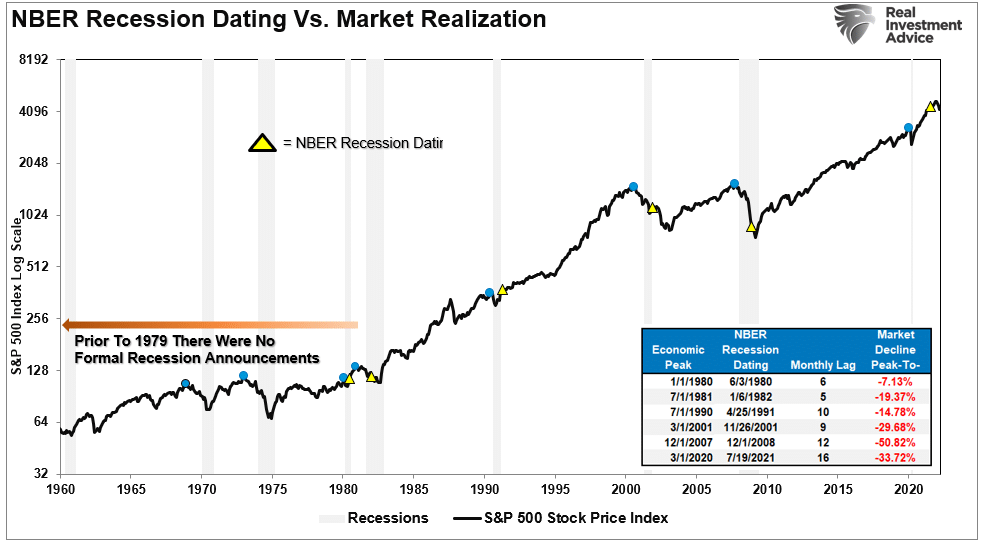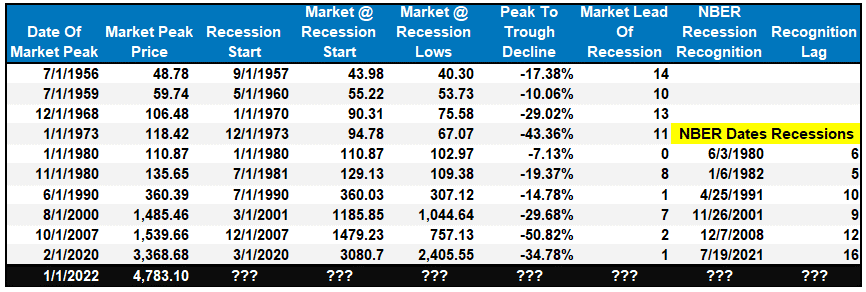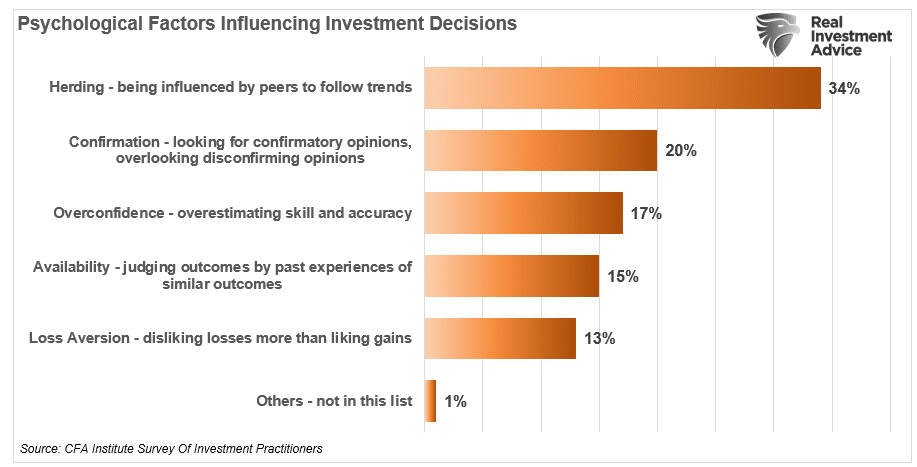Investing during a recession can be a very difficult, and often dangerous, prospect. However, it can be done if approached with a bit of strategy and preparation. Follow these tips to avoid losing it all when a recession hits!
What Is A Recession?
Let’s start with the definition of what a recession is. According to the National Bureau of Economic Research (NBER), the agency responsible for dating recessions, a recession is a period of two, or more, consecutive quarters of negative economic growth. While the “R-Word” gets discussed in the financial media as if it is the “coming apocalypse,” in reality, it is a period of declining economic growth.
The chart below shows the historical length of recessions over time.

Notably, the risk to investors during an economic recession is high. Historically, markets tend to correct rather sharply during recessionary periods.

Such is because the markets reprice the excess valuations given to financial assets during the previous expansion. Higher valuations during expansions tend to precede deeper reversions during recessions.

As is evident, recessions are coincident with market corrections and bear markets. The problem with trying to avoid a recession, from an investment perspective, is this: by the time a recession is evident, it is often too late.

A Day Late & A Dollar Short
The biggest risk of investing during a recession is putting a “recession investing strategy” into place at the right time. As I wrote in “Recession Risk Rising:”
“The problem with making an assessment about the state of the economy today, based on current data points, is that these numbers are only “best guesses.” Economic data is subject to substantive negative revisions as data gets collected and adjusted over the forthcoming 12- and 36-months.
Consider for a minute that in January 2008 Chairman Bernanke stated:
“The Federal Reserve is not currently forecasting a recession.”
In hindsight, the NBER, in December 2008, dated the start of the official recession as December 2007.
If Ben Bernanke didn’t know a recession was underway, how would we?”
Such is the biggest risk to investors. The chart shows the S&P 500 from 1960 to the present. Each of the blue dots is the peak of the market PRIOR to the onset of a recession. The yellow triangles are the official NBER recession announcements.

The issue to investors is evident. In 9 of 10 instances, the S&P 500 peaked and turned lower prior to the recognition of a recession.
The decline from the peak was considered “just a correction” as economic growth remained strong. Therefore, investors didn’t adjust their strategy to invest during a recession.
In reality, however, the market was signaling a coming recession in the months ahead. The economic data just didn’t reflect it as of yet.
The problem is in waiting for the data to catch up.

Today, we are once again seeing many of the same early warnings. If you have been paying attention to the trend of the economic data, the stock market, and the yield curve, the warnings are becoming more pronounced.

How To Invest During A Recession
Investing during a recession can be dangerous particularly when valuations across all asset classes are elevated. However, if you choose to invest during a recession, there are some steps to take to make sure you are prepared to weather the increased market volatility.
- Have excess emergency savings so you are not “forced” to sell during a decline to meet obligations.
- Extend your time horizon to 5-7 years as buying distressed stocks can get more distressed.
- Don’t obsessively check your portfolio.
- Consider tax-loss harvesting (selling stocks at a loss) so those losses can be offset against future gains.
- Stick to your investing discipline regardless of what happens.
Once you are prepared, what investments do well in a recession?
“A recession is a good time to avoid speculating, especially on stocks that have taken the worst beating. Weaker companies often go bankrupt during recessions, and while stocks that have fallen by 80%, 90%, or even more might seem like bargains, they are usually cheap for a reason. Just remember — a broken business at an excellent price is still a broken business.” – Motley Fool
That is very true, to make money in a recession focus on stocks that:
- Have consistent earnings growth over time.
- Focus on dividend-payers and avoid high leverage.
- Free cash flow and strong operating margins are key.
- Avoid companies dependent on consumer spending, have high cash burn rates or have negative incomes and earnings.
- Invest incrementally using lower prices to build positions.
- Lastly, don’t forget about bonds that offer a safe haven during volatile market environments.
Investing during a recession is not easy due to high volatility, falling prices, and negative media headlines. However, given a well-thought-out strategy, a longer-term timeline, and an ability to stick to your discipline, it can be very profitable.

How To Avoid Losing Money In A Recession
As noted, the biggest problem of investing during a recession is knowing that you are in one. There are certainly many indicators suggesting we could indeed be heading into a recession sooner than later, but unfortunately, we won’t know for sure until after the fact.
Therefore, we must respond to market warnings and take action to prepare for a recession in advance. That said, the most important thing isn’t necessarily what actions to take, but what behaviors to avoid. During market downturns, it is our emotional and behavioral biases that tend to inflict the most damage to our financial outcomes.
“Loss aversion” is one of the leading factors influencing investment decisions according to a recent survey from the CFA Institute.

“Loss aversion is a tendency in behavioral finance where investors are so fearful of losses that they focus on trying to avoid a loss more so than on making gains. The more one experiences losses, the more likely they are to become prone to loss aversion.” – Corporate Finance Institute
Therefore, to avoid losing money in a recession you must:
- Avoid trying to time the exact bottom.
- Don’t try to “day trade” markets
- Reduce leverage and speculative bets
- Avoid selling quality companies just because they are down.
I agree with Motley Fool’s conclusion:
“The bottom line is that, during recessions, it’s important to stay the course. It becomes a bit more important to focus on top-quality companies in turbulent times, but, for the most part, you should approach investing in a recession in the same manner you would approach investing any other time. Buy high-quality companies or funds and hold on to them for as long as they stay that way.”
Most importantly, you must know the difference between a “top-quality” company and one that isn’t.
Final Thoughts On How To Invest In A Recession Without Losing It All
There is a high risk of losing a lot of money in a recession if you aren’t strategic about how you invest. We hope that our points about tax-loss harvesting, staying the course, having adequate emergency cash, and avoiding emotional biases such as loss aversion, etc., have been useful.
If you decide not to go it alone, please consider setting up a meeting with one of our financial advisors. We are a wealth management firm in Houston serving clients across the country.


